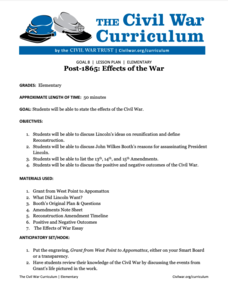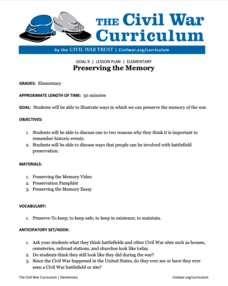American Battlefield Trust
Post-1865: Effects of the War
What did Lincoln want? Historians still debate this question, and perhaps people will never fully know. Class members examine the legacies of the war, including the Thirteenth, Fourteenth, and Fifteenth Amendments. The lesson plan also...
American Battlefield Trust
Civil War Overview: Elementary Lesson Plan
How do you teach the Civil War and all its intricacies within the time limits of an average school day? Using a three-part plan, teachers easily integrate coverage of key Civil War battles into the unit. The lesson includes activities to...
American Battlefield Trust
Creating a Historic Site Lesson Plan
What makes a place historic? Using events from their own lives, learners consider this question, then deem places from their world historic. They then curate the experience for visitors, creating signs and other materials for their...
American Battlefield Trust
Preserving the Memory
Civil War battlefields themselves are under siege by development and other forces. Using materials from the Battlefield Trust, individuals explore local areas that face threat and write letters to support their preservation. An...
American Battlefield Trust
Civil War Personalities: Individual Examples of Character
What is a hero? What is character? Using biographies of figures during the Civil War, both famous and lesser known, scholars consider these questions. After brainstorming what they think makes a hero, they examine the lives of those who...
American Battlefield Trust
1864-1865: Bringing the War to an End
The Civil War—in its breathtaking ferocity—came to a close in 1864. However, turmoil echoed throughout the country's politics, including the presidential context between Lincoln and McClellan. Performing chronology and primary source...
American Battlefield Trust
Gettysburg Address: Abraham Lincoln's Greatest Speech
Most Americans have heard of the Gettysburg Address, but may not know what it means and why is it so important. Following guidance and scaffolded prompts, scholars analyze the short document that left an undeniable impact on the American...
American Battlefield Trust
The Home Front
Women and children played key roles during the Civil War, even if their voices are often lost in history. By studying letters and personal testimony from them, budding historians get a glimpse into the day-to-day life of civilians during...
American Battlefield Trust
Civil War Play
Everyone has a role to play. Young scholars step into history by taking on the roles of soldiers—both male and female—during the Civil War using a fictionalized play of what life was like on the battlefield. Pupils also examine the roles...
American Battlefield Trust
1861: The Country Goes to War
What was it like to know the Civil War was coming? Using a graphic timeline activity and excerpts of speeches from Abraham Lincoln and Jefferson Davis, learners consider the early days of the conflict. The resource includes prompts for...
American Battlefield Trust
Life at War
It looks like a cracker, but hardtack was anything but. The staple of the Civil War soldier's diet is one of many aspects of military life that scholars consider using letters from soldiers back home and images from slavery. A PowerPoint...
American Battlefield Trust
1862: Antietam and Emancipation
The Emancipation Proclamation shifted the tone and purpose of the Civil War. Using a primary source analysis, pupils consider the significance of the document. A second activity investigates the founding of the United States Colored...
National Woman's History Museum
Defying British Rule: Women's Contributions to The American Revolution
Primary and secondary sources are the focus of a lesson that showcases the important role women played during the American Revolution. Pairs review sources and discuss their findings. A close-reading of an informational text leads the...
Purdue University
Animal Diversity and Tracking
What exactly are those glowing eyes in the night? Learners run an experiment to attract local wildlife and then document the number of visitors by identifying their tracks. They then analyze the data to draw conclusions about the types...
University of California
Impact of the California Missions on Native Americans
While the Spanish claimed to bring civilization to California indigenous peoples, in reality, they also brought violence and forced assimilation to European values. Primary sources, such as the reports of Catholic priests and Europeans...
California Education Partners
We Are The Ship
An assessment sheds light on scholars' ability to read, gather evidence, and draft an original written composition. Learners read an informative text twice before taking notes and discussing their thoughts and textual evidence with a...
California Education Partners
Seeing Eye to Eye
A performance task challenges scholars to read an informational text then respond with an explanatory essay. The exam begins with an independent reading of Seeing Eye to Eye by Leslie Hall. A second reading follows with the completion of...
California Education Partners
My Librarian is a Camel
A two-part assessment challenges scholars to gather information from reading then write an opinion piece. In part one, learners read, take notes, and answer text-related questions. In part two, participants use their new-found knowledge...
Alabama Department of Archives and History
An African American Represents Alabama during Reconstruction
The era after the Civil War saw a flourishing of African Americans exercising their rights. Using graphic organizers and Internet research, pupils consider the legacy of Benjamin Sterling Turner, who sat in Congress. Afterward, they...
Utah Education Network (UEN)
Utah Open Textbook: 4th Grade Science
How does weather affect Earth? Learners understand the characteristics of water and make predictions about weather patterns. They recognize how water and weather affect rocks and minerals through erosion. They also learn about fossils...
ReadWriteThink
Webcams in the Classroom: Animal Inquiry and Observation
Boost observational skills with an inquiry-based lesson that takes scholars on a virtual field trip. With help from webcams, learners observe animals in a zoo or aquarium. Observations go into a journal and a discussion is held to review...
Library of Congress
Marco Paul's Travels on the Erie Canal: An Educational Voyage
Following the book, Marco Paul's Travels on the Erie Canal, readers complete an activity for each chapter, take part in discussions, and respond to several questions. To show what they know, scholars create an alphabet book using primary...
British Council
William Shakespeare
After watching a three-minute video detailing the life of William Shakespeare, scholars take part in several activities designed to show what they know about the famous writer. Learners read a series of eight sentences and put them in...
Jamestown-Yorktown Foundation
What Was Everyday Life like in Colonial Virginia?
What was everyday life like in Colonial Virginia? To find the answer cooperative groups work collaboratively to read an informational handout and complete a graphic organizer. The speaker of the group then shares their new-found...

























